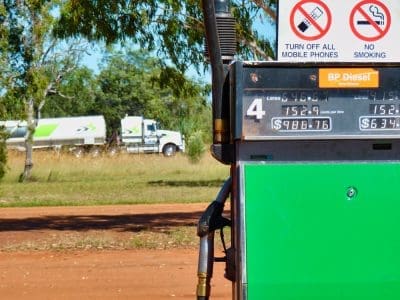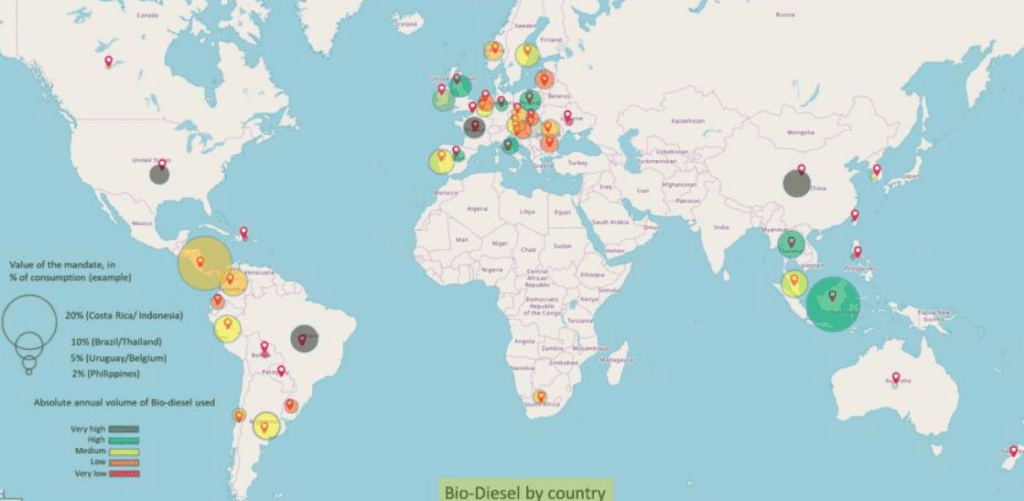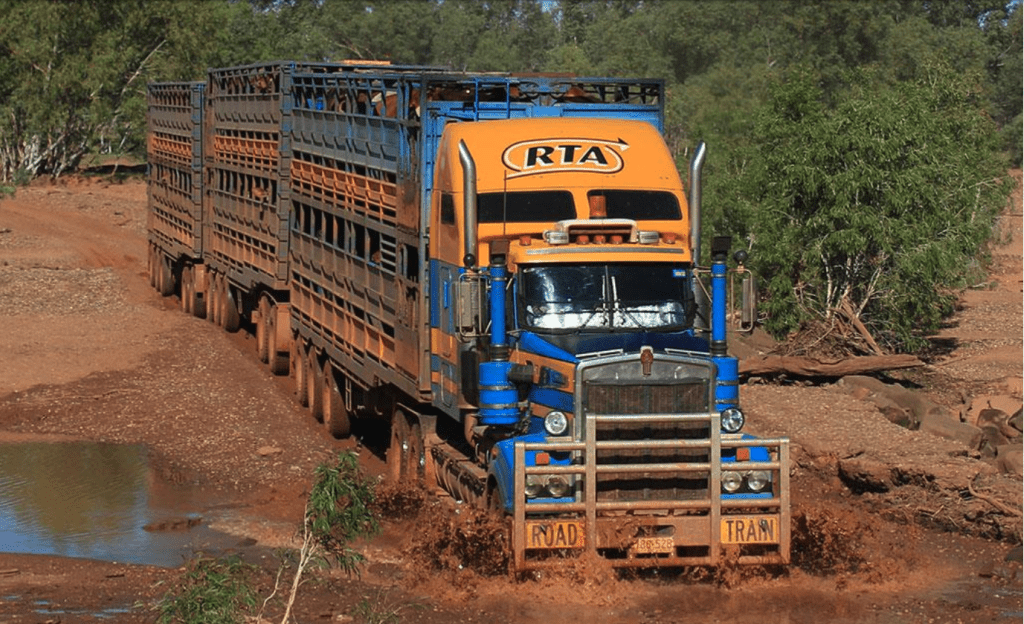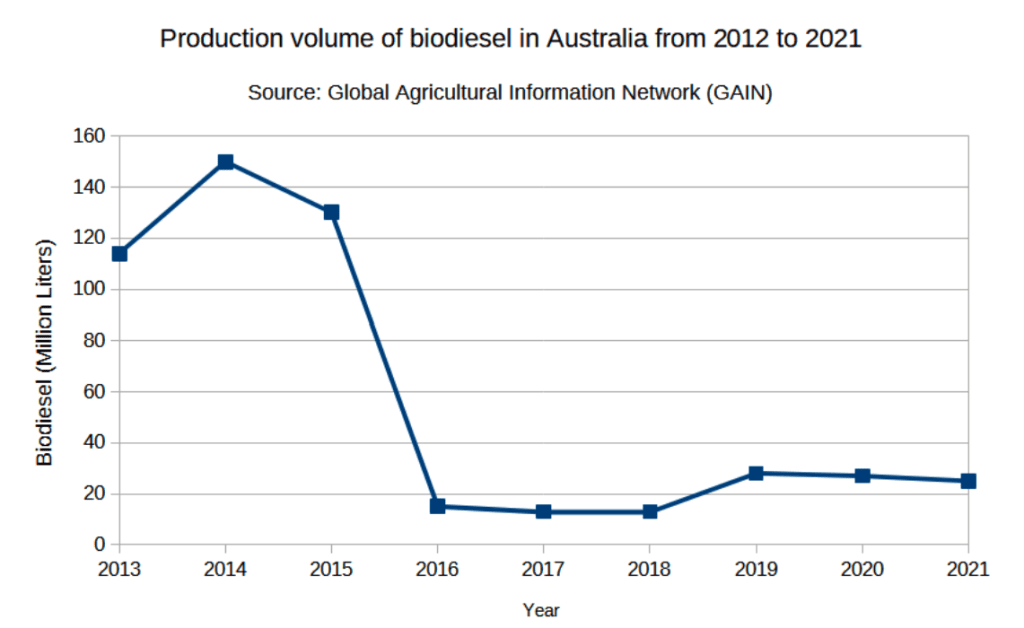Our business — EnviroAg Australia — works across many primary industries, and with many suppliers, including the land transport and petrochemical industries.
 In these investigative journeys we trip over some remarkable stories, good and bad.
In these investigative journeys we trip over some remarkable stories, good and bad.
Our collection of thought provoking facts below is worth a read.
Australia is reliant on imports for around 91 percent of fuel it consumes [1].
Transport consumes close to three quarters of liquid fuel (73pc), and more than half (54pc) of Australia’s liquid fuel is consumed by road/land transport [1].
Australia does produce a reasonable amount of its own crude oil, but exports about 75pc [11].
It then imports crude oil and fuels such as diesel, mostly through Singapore, Korea and Japan.
Australia only had 68 days of liquid fuel (January 2022) under the International Energy Agency’s (IEA) 90 day minimum stock requirement [1].
This has worsened, with as little as 50 days in storage, in recent times [11].
If our fuel imports are stopped, fuel supply stops and…therefore heavy vehicle (HV) land transport stops, rural, regional and remote Australia stops, and the entire economy will grind to a stop… Colloquially, “we are nationally screwed”.
Many EU countries have biodiesel mandates and are significant users of biodiesel (France, Germany) [3].
Our near neighbour, Indonesia, has a mandate of 20pc for biodiesel use [3]. Singapore has one of the largest biodiesel refinery plants in the world and generates biodiesel and renewable diesel (RD).
Use of tallow (93pc efficient [10]), or oilseeds, over soybean oil for biodiesel reduces greenhouse gas (GHG) emissions over fossil fuels by 79pc to 86pc lower than petroleum diesel [12], depending on how the accounting is undertaken, significantly improving industry and national sustainability.
The Australian red meat industry has set a target to be carbon neutral by 2030 (CN30). This means that by 2030, Australian beef, lamb and goat production, including lot feeding and meat processing, aim to make no net release of greenhouse gas (GHG) emissions into the atmosphere [13].
This target DOES NOT include the “off-farm” land transport necessary for the red meat industry to viably function.
HV Land transport required to sustain viable production systems is excluded from the MLA CN30 roadmap for GHG emissions avoidance and is presumably “on its own”…yet…
Australia currently exports a large amount of tallow to Singapore and Indonesia amongst other countries for biodiesel and RD production.
Exports of tallow to Singapore, for the manufacture of biodiesel and RD, have increased significantly in recent years due to reduced demand from biofuel refineries in Australia.[3] Australia exports non-GM oilseeds to the EU for the production of biodiesel.[7] This demand has increased the value of Australian tallow – to as much as $973/T [2]. Further increases in value are expected with increase demand for biodiesel.
Up to 5% biodiesel can be included in any diesel sold in Australia without additional labelling.[6]
Our regional, rural and remote primary industries are largely reliant on land transport. Even if rail networks were to expand, HV land transport is required to move commodity to rail heads. Diesel – electric rail will not get product commodity off-farm; one needs a truck in a remote location where electric vehicles’ (EV) can not necessarily be charged, and hydrogen fuelling is unlikely. Again…there is silence on this matter.
Diesel is intrinsically safer than other fuel oils with a high flash point of >60℃, as opposed to -43℃ for ULP and….as for Hydrogen it explodes if it enters air…so a leaky fuel line is dangerous.
Diesel is critical for military and emergency vehicles; when duty calls these vehicles are ready to fulfil their responsibilities safely in the most adverse of environments. This is a critical and underlying risk mitigation strategy in design and operation of these vehicles!
Biodiesel can also produce more NOx than ordinary diesel [16]. Biodiesel use without mitigation measures (additives) can generate more NOx than petrols. Less diesel is used (litre for litre), compared with petrol, per kilometre per tonne delivered.
Simply diesel is more efficient for delivery of payloads, and, on a normalised basis generates less NOx per kilometre per tonne delivered.
Proven mitigation technologies using additives reduce NOx emission by upto 93% [18]. In terms of tonnes of product delivered per km biodiesel produces less NOx and SOx (kg/T/km) than both ordinary diesel and petrol fuel[16].
GHG reduction technology ready can be applied now in diesel ship engines [19]. It can be applied now in new age truck and tractor engine. There are transport fleets with diesel engines that can be retained for ongoing use.
Replacements for diesel- and petrol-dependent HV transport (e.g. electric and hydrogen fuels) are immature and metaphorically remote to HV land transport in rural regional and remote Australia and will be for a long time.
There is a huge existing fleet of heavy vehicles in Australia that can readily use biodiesel “now” and well into the future.
There is no Australian Federal Government mandate for domestic biodiesel use; Queensland [9] and NSW [8] have small biodiesel mandates (0.5 – 2.0pc).
There has been a dramatic decline in biodiesel consumption in Australia since 2015.[4]
APAC Biofuel Consultants measured Australian total biodiesel consumption over several years. Consumption peaked in 2014–2015 at a value of 442 ML but crashed dramatically post July 2015 – 2016 to 35 ML.[4]
Australian Renewable Fuels, the largest biodiesel producer in Australia, closed in early 2016.
Why so?…Well, in 2016 unfavourable conditions of limited (no) mandate support, low international oil prices, high feedstock prices and insufficient tax relief to offset high feed stock prices led to the closure of a majority of the production facilities, resulting in a low production rate for the nation.[5]
The Australian production of biodiesel is estimated at only 25ML in 2021.[7]
Bizarrely, the Australian Government now pays the 2 remaining/existing fuel refineries to maintain capacity when they are loss making, per the Fuel Security Services Payment (FSSP) under the Fuel Security Act 2021.
The Government is investing in diesel storage, at just these 2 remaining refineries [17]. The value of Australia’s agriculture exports is about 14 per cent of our total goods and services exports, [14] and it is growing. Australia’s economy is largely based on its natural resources, with the minerals sector making the greatest contribution (70.7 percent) of our total goods and services exports [15]. The value of all primary industry exports is more than 85pc of Australia’s total goods and services. The vast majority of this primary production and economic value is dependent on the use of diesel and will continue to do so. Diesel costs at the bowser have doubled in the last two years (AIP) (2020-2022).
The Federal Government is largely silent on:
- The potential vulnerability of our entire nation and economy to loss of diesel supply,
- The issue of security in diesel supply, now and into the future, for our primary industry,
- The urgency and importance of a (revitalised) biodiesel supply as a critical transitionary fuel supply for HV land transport in rural regional and remote Australia, and,
- The importance of biodiesel in reductions in GHG emissions and sustainability.
The negligence and “silence” are gob smacking. This is a National “Achilles Heel” of epic proportions.
In our view, all primary industry, the heavy vehicle transport sector, and all rural, regional and remote Australian’s need to stand up and speak up and out.
It is clear from these facts that Australia is a gross laggard in policy and management of biodiesel mandates and practical transitionary measures to support our critical heavy vehicle land transport systems.
- Dr Simon Lott is a Managing Director/Specialist Engineer for EnviroAg Australia and Dr Tracy Muller is Senior Scientist/Research analyst EnviroAg Australia.
EnviroAg Australia has a range of clients from some of rural industry’s largest companies to small family based agri-businesses, construction and petroleum companies, and government bodies, and oversees a extensive range of R&D projects in animal welfare and soil conservation.
References:
[1] The Australia Institute, “Australia’s 91% reliant on foreign oil: Research Report”, 2022. Online. Accessed at Australia 91% reliant on foreign oil: Research Report – The Australia Institute.
[2] MLA, “Tallow process performing well”, 2020. Online. Accessed at MLA https://www.mla.com.au/prices-markets/market-news/2020/tallow-prices-performing-well/.
[3] IATA, “Examples of ground transport biofuel mandates around the world”, 2023. Online. Accessed at https://www.iata.org/contentassets/d13875e9ed784f75bac90f000760e998/biofuelmandates_fact-sheet6-biofuel.pdf.
[4] Cochran, Mike, “Australian Biofuels 2017 Industry Overview and Developments – Asian Pacific Fuel Industry”, 2017. Online. Accessed at https://web.archive.org/web/20180510051203/https://apfiforum.com/wp-content/uploads/2016/03/APAC-Mike-Cochran.pdf.
[5] Environment, “Fuel Standard (Biodiesel) Determination 2003”, 2003. Online. Accessed at https://www.legislation.gov.au/Details/F2006B01373).
[6] “Biodiesel Blends” (http://biofuelsassociation.com.au/biofuels/biodiesel/oems-and-approved-blends/). Biofuels Association of Australia. Retrieved 2018-05-03.
[7] Biki, Zeljko (2022). “Australia: Biofuels Annual 2022” (https://apps.fas.usda.gov/newgainapi/api/Report/DownloadReportByFileName?fileName=Biofuels%20Annual_Canberra_Australia_AS2022-0029.pdf) (PDF). USDA GAIN Report.
[8] NSW Government Fair Trading, “Service stations- Biofuels Requirements”, 2016. Online. Accessed at http://www.fairtrading.nsw.gov.au/ftw/Businesses/Specific_industries_and_businesses/Service_stations.page.
[9] Business Queensland, “Queensland biofuel mandate”. Online. Accessed at https://www.business.qld.gov.au/industries/manufacturing-retail/retail-wholesale/selling-fuel-qld/qld-biofuelmandate.
[10] Gandure, J. , Ketlogetswe, C. and Jonas, M. (2017) Production, Composition and Fuel Properties of Tallow Biodiesel: A Case of Botswana. Energy and Power Engineering, 9, 355- 365.
[11] Bulk Fuel Australia, “Where does Australia’s diesel fuel come from”, 2018. Online. Accessed at Where does Australia’s diesel fuel come from? – Bulk Fuel Australia.
[12] Xu, H., Longwen, O., Yuan, L., Hawkins, T., and Wang, M. (2022). Life cycle greenhouse gas emissions of biodiesel and renewable diesel production in the United States. Environmental Science & Technology. 56, 7512-7521.
[13] MLA, “Carbon Neutral 2030”, 2021. Online. Accessed at Carbon neutral 2030 R&D | Meat & Livestock Australia (mla.com.au).
[14] DFAT, “Agricultural Trade”. Online. Accessed at Agricultural trade | Australian Government Department of Foreign Affairs and Trade (dfat.gov.au).
[15] Flood, Matthew. “Australia’s 5 most valuable mineral exports (updated 2022)”, 2022. Online. Accessed at Australia’s 5 Most Valuable Mineral Exports (Updated 2022) – Investing News Australia.
[16] ACE Mechanics. “Running and maintenance costs of a petrol Vs diesel car” (updated 2023)”, 2023. Online. Accessed at Running and Maintenance Costs of a Petrol Vs Diesel Car • ACE Mechanics.
[17] ARENA. “Progress being made to produce plentiful and affordable biofuels in Australia” (updated 2023), 2023. Online. Accessed at Progress being made to produce plentiful and affordable biofuels in Australia – Australian Renewable Energy Agency (ARENA).
[18] Palash, S., Masjuki, H., Kalam, M., Masum, B., Sanjid, A. and Abedin, M. 2013. “State of the art of NOx mitigation technologies and their effect on the performance and emission characteristics of biodiesel-fuelled compression ignition engines. 76, 400-420.
[19] Friends of the Earth International. 2005. “Prevention of Air Pollution from Ships”. Marine Environment Protection Committee. International Maritime Organisation. Agenda Item 4




HAVE YOUR SAY